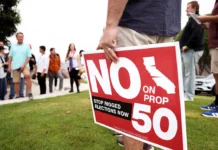(Reuters) – On the eve of a visit to London by U.S. President Donald Trump, British Prime Minister Keir Starmer abruptly summoned Labour lawmakers to a meeting to try to reassert his authority over his increasingly fractious party.
Starmer, whose poll ratings have sunk since a huge election win in July 2024, appealed to the lawmakers for support, three people who attended the meeting told Reuters. It was a rare acknowledgement that decisions taken by his Downing Street office had widened a rift with Labour members of parliament.
Eight weeks later, those rifts have burst into the open after a briefing to selected media outlets by unnamed allies of Starmer who said the prime minister would fight any leadership challenge – although none had yet materialised.
The comments exasperated Labour lawmakers, five of whom told Reuters on condition of anonymity that the episode had renewed questions about Starmer’s authority.
DOWNING STREET OPERATION COMES UNDER FIRE
One lawmaker said it showed how the prime minister and his team lacked political nous.
Another said the briefing to several newspapers and media outlets smacked of a “bunker mentality” where decisions are taken by a handful of advisers without any discussion with the wider party – decisions which often land badly.
The lawmakers refused to be named in order to speak more freely about the government.
Chris Hopkins, political research director at polling firm Savanta, said it was a bad look for the government two weeks before what is expected to be an unpopular budget. “Everything has become a disaster when it shouldn’t have been,” he said.
It was not clear who gave the briefing, and Starmer was quick to distance himself from it in parliament. He said he “never authorised attacks” on his ministers and that his team was “united”. He defended his chief of staff, Morgan McSweeney.
Being invited by a Labour lawmaker for a stroll along a new promenade in her Welsh constituency, Starmer joked: “That’s a very appealing invitation just at the moment.”
But the message from the so-called allies of the prime minister that Starmer would fight off any leadership challenge – either after his government’s budget announcement on November 26 or local elections next May – had clearly rattled him.
The problem was that the focus of the briefing, health minister Wes Streeting, quickly denied being part of any such plot to unseat Starmer on Wednesday, branding it “totally self-defeating … not least because it’s not true”.
He even went so far as to refer to a “toxic culture” in Downing Street but did not believe the people behind the briefing were speaking for the prime minister.
A third Labour lawmaker said the briefing came out of the blue and that it seemed “odd to air our family affairs to the nation”, while a fourth described it as “bonkers” and said it underscored Starmer’s weak position.
STARMER’S OUTREACH TO LAWMAKERS HAS FAILED SO FAR
It was the latest misfire by Starmer’s team, and one which will mean he will again have to appease his lawmakers in meetings that have proliferated as his authority falters.
And that has a cost.
Starmer was forced to drop planned cuts to the ballooning welfare budget earlier this year to quell a revolt in his party, meaning investors may be sceptical about any further pledges to plug the fiscal black hole with spending cuts, adding pressure on the government to hike taxes in the next budget.
On September 15, before Trump’s arrival on an unprecedented second state visit, Starmer summoned his lawmakers to meet on a parliamentary terrace on the bank of London’s River Thames at 8:45 p.m. – a gathering moved inside because of a downpour.
The meeting came four days after the dismissal of Peter Mandelson as Britain’s ambassador to the U.S. over his ties with the late convicted U.S. sex offender Jeffrey Epstein, and 10 days after the resignation of Starmer’s deputy, Angela Rayner.
Both events unnerved some Labour lawmakers, who were due to leave parliament to return to their constituencies the next day and were concerned about hostility from local voters, forcing Starmer to try to calm them at the meeting.
Little has changed since, with the list of complaints from Labour lawmakers only growing.
Finance minister Rachel Reeves has indicated she will probably break a key election pledge and raise income tax at the budget. She also had to fend off questions over a rental property and the government has come under further fire over the accidental release of a migrant sex offender.
The briefing has only made matters worse, but even those lawmakers who are highly critical of Starmer say it would be very difficult to remove him unless he himself decided to go.
“We literally have no mechanism (to oust him),” one said.
For now, Starmer looks set to remain in post with the budget and local elections next May more in focus. He will try to dispel the characterisation of him being in a bunker – something that helped bring down former prime minister Boris Johnson who had to step down after his ministers quit en masse in 2022.
A fifth Labour lawmaker, a long-time member of parliament who served under the governments of Labour prime ministers Tony Blair and Gordon Brown, said Starmer was the most detached prime minister he had served under.
He said Starmer’s Downing Street operation had failed to engage with lawmakers, accusing it of “absolute arrogance beyond belief”.



















